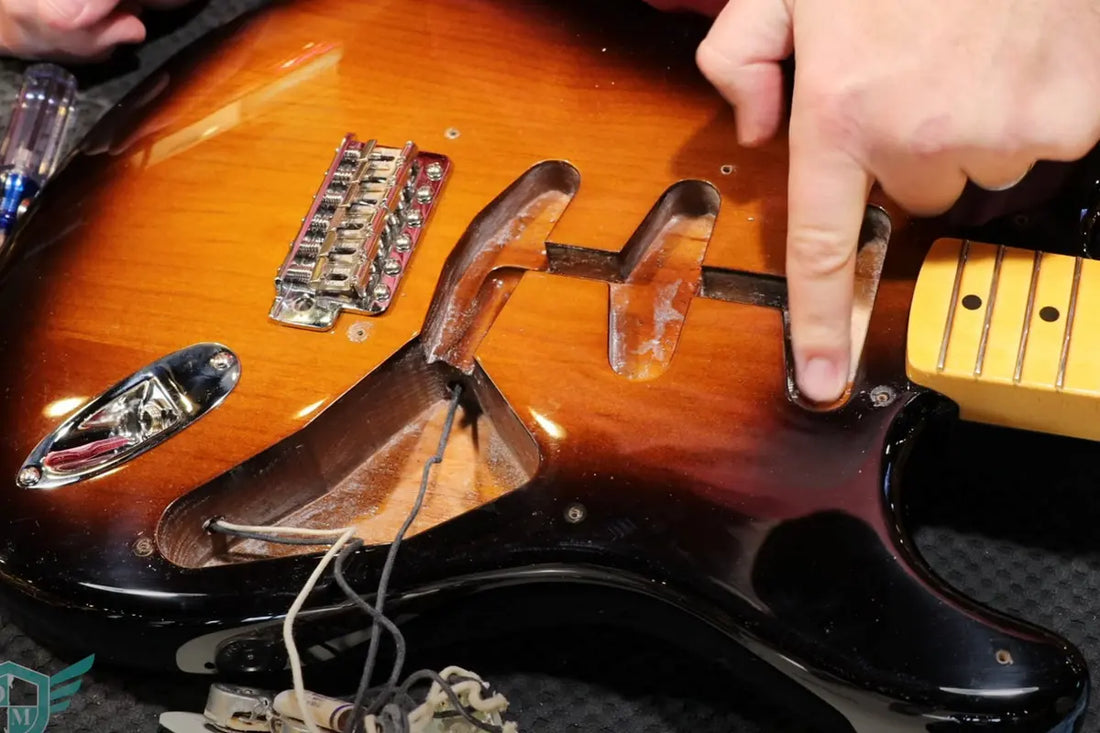Why Your Stratocaster Sounds Like a Radio Station (And How to Fix It)
Here at Danville Music, we see it all the time - guitarists walking in frustrated with their single coil pickups picking up everything from fluorescent lights to radio signals. Our team has been helping players tackle this issue for years, and today I want to share one of our favorite solutions with you.
Shielding your guitar.
It's not just about Fender Stratocasters, though they're notorious for this problem. Anything with single coil pickups can turn into an unwanted antenna. That's exactly why humbucking pickups were invented in the first place - to combat this very issue.
But here's the thing: you don't need to swap out your pickups to get relief.
The Beauty of a Simple Solution
Shielding your guitar is one of those rare wins in the guitar world. It's incredibly cheap, it's a fun project you can tackle in an afternoon, and it genuinely works. We're talking about a real solution to those annoying noises that creep into your signal chain.
The concept is straightforward - we're battling high frequency and low frequency RF signals that love to propagate through your guitar's electronics. By creating a barrier, we reduce external noise from getting into your system.
It's like giving your guitar a suit of armor.
What You'll Need (It's Less Than You Think)
The supply list is refreshingly short: copper tape, a razor knife, and a soldering iron. That's it. Well, I always suggest having a pot of fresh coffee on hand, but that's more for the experience than the actual work.
These simple materials can transform your noisy single-coil setup into something much more manageable.
The Process: Precision Meets Simplicity
First things first - we clean the inside of the guitar thoroughly. The copper tape needs to stick properly to the inside of the body, so this step matters more than you might think.
Then comes the main event: covering the entire inside cavity with copper tape. Here's where attention to detail pays off. We make absolutely sure the top of the pickguard doesn't touch the copper that's inside the body cavity.
Multiple contact points create different voltages and continuity issues.
Translation? More hum, not less. We keep the copper just below the ledge and maintain it on the pickguard separately.
The next step involves soldering a lead to the copper tape in the cavity. The other end of that lead connects to the back of a potentiometer in the pickguard. This creates our ground connection in the circuit, which is essential for eliminating hum.
The Pickguard Gets the Same Treatment
The back of the pickguard receives its own copper tape application. We're careful to cut around any spots where screws might interfere - nobody wants little metal scraps rattling around inside their guitar.

Here's a pro tip we've learned over the years: we put small dabs of solder to connect each piece of copper tape on the pickguard together. This eliminates any continuity issues from adhesive overlap between pieces.
Keep those solder dabs as flat as possible.
You don't want waves and bumps affecting how your pickguard sits against the body.
Setting Realistic Expectations
Let's be honest about something - if you have single coil pickups, you're going to get some hum. Unless you've got some sort of special noise filtration system (usually newer and probably patented), that's just part of the territory.
Don't be a wuss about it. It's part of the tone.
Our advice? Turn your amp up. That'll drown out most remaining noise, including your drummer sometimes.
Your Next Step Toward Cleaner Tone
Shielding transforms a noisy guitar into a more professional instrument without changing its fundamental character. It's one of those modifications that makes you wonder why you waited so long to try it.
The project gives you hands-on experience with your instrument while solving a real problem that affects your playing and recording. Plus, there's something satisfying about opening up your guitar and making it better with your own hands.
Stop by Danville Music if you want to see this process in action or need help with your own shielding project. We're always happy to help fellow players get the most out of their instruments.
Trending Posts
Recent Posts
Best Guitar Amps Under $1000 for 2025
December 09, 2025
Best Guitars Under $500: Expert Picks for 2025
November 20, 2025


 Adam Schuman
Adam Schuman




